Oyos Saroso H.N.
Bandarlampung
No discussion about modern Indonesian literature in Lampung would be complete without touching upon Isbedy Stiawan ZS. The father of five, with two grandchildren, is now undeniably Lampung's literary icon.
"When my two grandchildren were born and I stopped working as a journalist, my enthusiasm to write surged uncontrollably. I do not wait for inspiration to hit me. Instead, I actively look for inspiration and create poetic moments," he said.
Throughout 2004, for example, four of his books were published. These included, Bulan Rebah di Meja Diggers (The Moon Lies Down on Diggers Table), an anthology of short stories published by Beranda in August, and Dawai Kembali Berdenting (Musical Instrument Strings Give the Twang Again), another anthology of short stories, published in November by Logung Pustaka.
Perempuan Sunyi (Women in Silence), another anthology of short stories, was published by Gama Media in December, and Dongeng Sebelum Tidur (Bedside Tales), stories for children, was published by Beranda in September.
The year 2005 has so far seen the publication of two of his collection of short stories, namely Selembut Angin Setajam Ranting (As Gentle as the Wind, As Sharp as the Twig, LP Publishing House, April) and Seandainya Kau Jadi Ikan (If You Turned into a Fish, Gramedia PustakaUtama, May), an anthology of short stories.
His new collection of short stories, Hanya untuk Satu Nama (Only for One Name, Bentang, Yogyakarta) will see the light of day in June.
As of now there are about 300 poems and 100 short stories to his credit. Aside from being published in nearly all print media publications in Indonesia, his stories and poems have been published in five anthologies of his poetic work and dozens of anthologies together with other poets' work.
Some of his poems have been broadcast on German radio station Deutsche Welle, performed as musically oriented poems by poet Geoff Fox of Australia and performed on the theatrical stage in Lampung.
"I will continue writing until my hand can no longer write and my mouth can no longer utter literary works. This will happen when the cultural editors in the mass media and the publishers reject my work.
"As long as my work is acceptable, I will continue to write. I live on writing. With my poems and short stories I feed my family," he said.
In the last four years, following his resignation as a journalist, he has relied completely on writing as a means of living to feed his family. He is very disciplined over how he manages his time.
"As a writer, I stick to a clear work schedule. Each day I write between 7:30 a.m. and noon and between 7:30 p.m. and 1 a.m. the next morning. Once I'm at my computer, ideas come freely to me. I don't plan the ending of my stories," he said.
Although he spends most days writing, Isbedy still sets aside some time to meet his fellow writers and fans. Sometimes he presents a paper at a seminar or gives a cultural address. At other times he does poetry readings and takes part in protest rallies at the provincial legislative assembly in an effort to persuade provincial legislators to pay more attention to budgetary allocations for the poor.
When the tsunami hit Aceh, he and a number of non-governmental organizations pioneered the establishment of Lampung Ikhlas (Sincerity of Lampung), an association made up of various non-governmental organizations and individuals, with the common purpose of distributing relief aid and sending volunteers to Aceh and North Sumatra.
"I live in the community. The characters in my stories are taken from the community. It is impossible for me to avoid social problems and live in an ivory tower," he said, explaining why he was involved in nonliterary activities.
Christian Heru Saputro, his friend and also a loyal reader of his works, has said that Isbedy is not choosy about the mass media he sends his stories to. "He sends them to literary journals and women's tabloids and radio stations. That's why his works are popular not only among the literati but also housewives and high-school students," he said.
Saputro also said that Isbedy's early poems contained a strong sufic element. In the years following reform, however, his works have centered more on social problems. The problems in his stories are derived from daily social problems, too.
"If you are to find his weaknesses, perhaps they are his stubbornness and his refusal to compromise. Besides, sometimes he is too strong when he lashes out at the regional administration. As a fellow member of the executive board of Lampung Arts Council, I'm often worried that the provincial budget is the source of finance for our council," said Saputro.
Isbedy began his work as a writer with hard work. In the late 1970s Isbedy tended his parent's cake stall and spent a lot of time reading there. Later, he recorded the experience in a story and sent it to RRI Tanjungkarang (the local radio station), to be broadcast on the station's youth program.
Although he was only a senior technical school graduate, young Isbedy never stopped learning. He learned how to write poems and short stories by himself. After a drama rehearsal, for example, he would discuss literary matters with his friend. That way he improved his creativity as a writer.
Sumber: The Jakarta Post, 30 Mei 2005

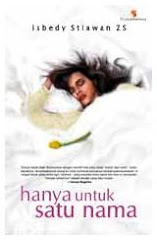

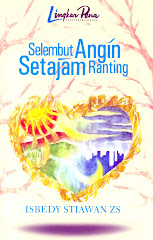



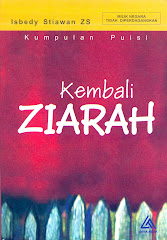
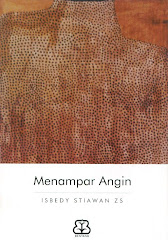

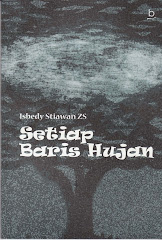



1 komentar:
голые молодые онлайн http://free-3x.com/ большие анусы малолеток free-3x.com/ голая школьница фото [url=http://free-3x.com/]free-3x.com[/url]
Posting Komentar